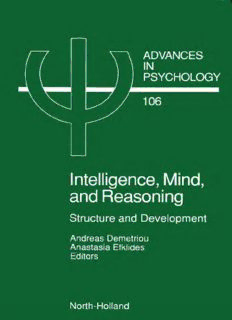Table Of ContentINTELLIGENCE, MIND, AND REASONING
Structure and Development
ADVANCES
IN
PSYCHOLOGY
106
Editors:
G. E. STELMACH
P. A. VROON
INTELLIGENCE, MIND,
AND REASONING
Structure and Development
Edited by
Andreas DEMETRIOU
and
Anastasia EFKLIDES
Department of Psychology
Faculty of Philosophy
Aristotelian University of Thessaloniki
Thessaloniki, Greece
1994
NORTH-HOLLAND
AMSTERDAM LONDON * NEW YORK TOKYO
NORTH-HOLLAND
ELSEVIER SCIENCE B.V.
Sara Burgerhartstraat 25
P.O. Box 211, lo00 AE Amsterdam, The Netherlands
ISBN: 0 444 89714 3
0 1994 Elsevier Science B.V. All rights reserved.
No part of this publication may be reproduced, stored in a retrieval system or transmitted in any
form or by any means, electronic, mechanical, photocopying, recording or otherwise, without the
prior written permission of the publisher, Elsevier Science B.V., Copyright & Permissions
Department, P.O. Box 521, 1000 AM Amsterdam, The Netherlands.
Special regulations for readers in the U.S.A. - This publication has been registered with the
Copyright Clearance Center Inc. (CCC), Salem, Massachusetts. Information can be obtained from
the CCC about conditions under which photocopies of parts of this publication may be made in
the U.S.A. All other copyright questions, including photocopying outside of the U.S.A., should be
referred to the copyright owner, Elsevier Science B.V., unless otherwise specified.
No responsibility is assumed by the publisher for any injury and/or damage to persons or property as
a matter of products liability, negligence or otherwise, or from any use or operation of any
methods, products, instructions or ideas contained in the material herein.
This book is printed on acid-free paper.
Printed in The Netherlands
V
Preface
Most of the contributions to this volume are revised versions of papers presented
at two symposia, organised by the editors, at the 4th Conference of the European
Association for Research on Learning and Instruction in Turku, Finland, in 1991.
Four of the contributors were specifically invited to submit a paper for this volume,
so that the various approaches to intelligence, mind and reasoning are better
presented. The contributions in the first part deal with intelligence and mind.
The contributions in the second part deal with mind and reasoning. Robert
Sternberg in the concluding chapter offers an overview and discussion of all the
papers and, through an analogy, makes it clear that if we are to understand
intelligence we need a multi-tradition approach that takes into account and
perhaps transcends all individual approaches. This is a need also recognised by
most of the contributors and the editors themselves, who feel that there are various
levels of description of that evading entity called intelligence.
The editors would like to express their warmest thanks to Smaragda Kazi from
the Department of Psychology of the Aristotelian University of Thessaloniki and
the Art of Text Publishing Company, Thessaloniki, Greece for the secretarial
assistance and diligence in producing the text.
Andreas Demetriou
Anastasia Efklides
This Page Intentionally Left Blank
vii
Contents
Preface ........................................................................................................ Page v
List of contributors ............................................................................................ vii
Intelligence, mind and reasoning: Three levels of description
Andreas Demetriou and Anastasia Efldides .................................................... 1
Part I. Intelligence and mind
1. A person-situation interaction theory of intelligence in outline
Richard E. Snow.. ........................................................................................... 11
2. Taking stock of what there is: The case of cognitive abilities
Johan Olav Undheim ..................................................................................... 29
3. Hierarchical models of intelligence and educational achievement
Jan-Eric Gustafsson ..................................................................................... ..45
4. Structure, development, and dynamics of mind:
A meta-Piagetian theory
Andreas Demetxiou and Anastasia Efldides .............................................. 75
5. The older child’s theory of mind
William V. Fabricius and Paula J Sch wanenflugel ............................... ..111
Part 11. Mind and reasoning
1. Reasoning, metareasoning and the promotion of rationality
David Moshman ........................................................................................... 135
2. The structure and development of propositional reasoning ability:
Cognitive and metacognitive aspects
Anastasia EMides, Andreas Demetriou, and Yiota Metallidou ........... 151
3. Reasoning models and intellectual development
Leslie Smith,. ............................................................................................... ..173
4. A representational communication approach to the development
of inductive and deductive logic
Peter E. Langford and Robert Hunting .................................................... 191
viii
Concluding chapter
Gulliver Ravel's travels:
An excursion to the theoretical islands of intelligence
Robert$ Stemberg. ........................................................................................... 213
Name index ....................................................................................................... 233
Subject index ..................................................................................................... 237
ix
Contributors
Demetriou Andreas, Department of Psychology, Faculty of Philosophy, University
of Thessaloniki, Thessaloniki 54006, Greece
Efklides Anastasia, Department of Psychology, Faculty of Philosophy, University
of Thessaloniki, Thessaloniki 54006, Greece
Fabricius William V., Department of Psychology, Arizona State University,
Tempe AZ 85283-1 104, USA
Gustafsson Jan-Eric, Department of Education and Educational Research,
University of Goteborg
Box 1010, S-43126 Molndal, Sweden
Hunting Robert, School of Education, La Trobe University, Bundoora, Victoria,
Australia 3083
Langford Peter E., School of Education ,L a Trobe University, Bundoora, Victoria,
Australia 3083
Metallidou Yiota, Department of Psychology, Faculty of Philosophy, University
of Thessaloniki, Thessaloniki 54006, Greece
Moshman David, Department of Educational Psychology, University of Nebraska,
Lincoln, NE 68588-0641, USA
Schwanenflugel Paula J., Department of Educational Psychology, Aderhold
Hall, University of Georgia, Athens, Georgia 30602, USA
Smith Leslie, Department of Educational Research, Lancaster University, LA1
4TY, UK
Snow Richard E., School of Education, Stanford University, Stanford, California
94305-3096, USA
Sternberg Robert J., Department of Psychology, Yale University, Box 11A Yale
Station, New Haven, CT 06520-7447, USA
Undheim Johan Olav, Department of Psychology, AVH, University of Trondheim,
N-7055 Dragvoll, Norway
Description:This volume aims to contribute to the integration of three traditions that have remained separate in psychology. Specifically, the developmental, the psychometric, and the cognitive tradition. In order to achieve this aim, the text deals with these three aspects of human knowing that have been the f

